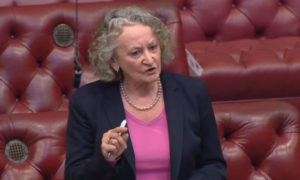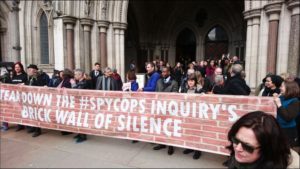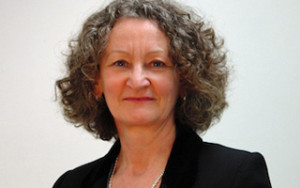Jenny Jones Challenges the Government on Spycops
 Last Wednesday, 21 March 2018, Jenny Jones (aka Baroness Jones of Moulsecoomb) probed the government about Britain’s political secret police in the House of Lords.
Last Wednesday, 21 March 2018, Jenny Jones (aka Baroness Jones of Moulsecoomb) probed the government about Britain’s political secret police in the House of Lords.
Her question had been submitted in advance, and it focused on what the government knew about the disgraced spycops units.
The Special Demonstration Squad was directly funded by the Home Office for its first twenty years. The government must have wanted something back for the millions it spent, and it received reports from the SDS.
But when the government commissioned ex-Audit Commission director Stephen Taylor to investigate and report in 2015, he couldn’t find a single document anywhere in any of the Home Office archives.
How much the government knew of the detail of the units’ tactics, such as the psychological and sexual abuse of women, is unknown. With that in mind, Jones challenged the Home Office Minister, Baroness Williams of Trafford.
As there had been a mass walkout of the victims and their legal team earlier in the day, other lords took up that issue to highlight the crisis of confidence in the public inquiry.
Here is the full video and transcript of the session (the video has closed captions):
Baroness Jones of Moulsecoomb (Green Party): I beg leave to ask the question standing in my name on the order paper [To ask Her Majesty’s Government what communications they have had, over the last 30 years, with police forces regarding the tactic of undercover police officers forming sexual relationships to develop their cover stories].
The Minister of State, Home Office (Baroness Williams of Trafford) (Conservative): My Lords, as part of its terms of reference the undercover policing inquiry is investigating the state of awareness of undercover police operations of Her Majesty’s Government since 1968.
The Home Office is a core participant in that inquiry and is in the process of making disclosure to the inquiry of material relevant to the terms of reference. The inquiry will report its findings once all the evidence has been reviewed.
Baroness Jones: Well, I thank the noble lady for her response which, of course, is not an answer to my Question.
I’m not sure if she is actually aware that, over a period of 24 years from 1985 to 2009, almost every single year there was a state-sponsored sexual relationship between a police officer and a woman who at no point was accused of doing anything illegal – not arrested, not accused – I just don’t understand how the Minister can sit there and think that this is alright.
This strikes at the heart of the ethics and the integrity of our police forces, and of course our security services. I must stress that the cases we know about are only the ones we have heard about, those are the only police names in the public realm. We don’t know all of them. Until we know all the police undercover names we won’t know how many victims there were.
I am also concerned about the Inquiry. The Minister may know that there was a walkout today by the whole legal team of the women involved and the women themselves. So how is the Government going to restore the credibility of that inquiry?
Baroness Williams: The noble lady refers to ‘state-sponsored’. I would refer her to the actual terms of reference of the inquiry, which is to ‘ascertain the state of awareness of undercover police operations of Her Majesty’s Government’. That is precisely what the inquiry was set up to do.
In terms of the walkout of today, I have been made aware of that walkout, and I am aware that the hearings are still ongoing. I would encourage all core participants – indeed, anyone impacted by undercover policing – to participate fully in the inquiry so that we can learn the lessons and get to the truth.
Lord Kennedy of Southwark (Labour & Co-operative Party): My Lords, can the noble lady confirm this is a very serious matter? Notwithstanding anything that comes out of the inquiry and the recommendations that follow, that she is absolutely confident that robust procedures are now in place and that it can never happen again?
Baroness Williams: My Lords, I would love to stand at this Dispatch Box and say that certain things could never happen again, but nobody can legislate for the odd rogue undertaking or the malicious intent of people. Therefore, one cannot be absolutely certain that it could never happen again. What one can do is put measures in place to try and mitigate as far as is possible [so] that it never happens again.
Lord Mackenzie of Framwellgate (Non-affiliated): Does the noble Minister agree that undercover policing is an essential tool in the fight against terrorism and crime and that, provided it is properly regulated and standards are adhered to, we shouldn’t judge the majority of very brave police officers that go undercover by the misdeeds of a few?
Baroness Williams: I must completely concur with the noble Lord. He is absolutely right, so much crime has been unearthed by the use of undercover policing. As I say, there are now strict rules in place to mitigate unacceptable behaviour from going on and I couldn’t agree more with him.
Baroness Burt of Solihull (Liberal Democrat): We know that this inquiry has already taken three years, and it’s expected to take another year before the victims get answers – campaigners walking out in protest today notwithstanding. We also know that the Special Demonstration Squad has been disbanded. But it would be naive to think that all embedded undercover work has ceased.
What assurances can the Minister give that the culture, practice, instructions to and supervision of undercover officers have already changed to ensure that, as far as is humanly possible, no man or woman will ever be subjected to these practices again?
Baroness Williams: The noble lady makes a very helpful point, because the policing Code of Ethics makes it clear that police officers should not use their professional position to, ‘establish or pursue an improper sexual or emotional relationship with a person with whom you come into contact in the course of your work’. The Regulation of Investigatory Powers Act 2000 provides the legal framework for the lawful deployment of undercover officers as covert human intelligence sources [CHIS]. We also have the 2014 CHIS codes of practice.
In relation to the point she makes about the length of time that the inquiry has taken, the slight extension to the length of the inquiry is due to purely the sheer number of pieces of information the inquiry has to look at.
Lord Faulks (Conservative): My Lords, I understand that the walkout from the inquiry was because of a sense that it was important that the individual police officers were actually identified by name.
I think my noble friend the Minister confirm that, by definition, undercover police officers have a cover name, and that, whatever the importance of getting to the bottom of what went on in this inquiry, it is important that they retain that anonymity, because that is a pre-eminent part of what they do.
Baroness Williams: My noble friend is absolutely right, and of course it protects the safety of those people as well.
Lord Soley (Labour): So, to confirm, this is not just a matter of rules and regulations? If it went on for so long, there must have been a serious management failure, because if there is the relationship between a senior officer and the person doing the job, that relationship is crucial in terms of keeping a check on their behaviour. That seems to me, as an outsider, not to have happened, and it’s what we ought to focus on.
Baroness Williams: I wouldn’t like to speak for the chair of the inquiry, but I am sure that some of the institutional failures that happened way back in the day will what the inquiry looks at.
Lord Scriven (Liberal Democrat): In the walkout today, the leading QC who was representing the victims said that the walkout was due to the legal teams not being able to participate in a meaningful way. How have we got to a position where this has been going on for three years, cost £9,000,000 and senior QCs feel they cannot participate in a meaningful way?
Baroness Williams: My Lords, the people who walked out will have their reasons for walking out, but I know that the Home Secretary has full confidence in the chairman to carry out the inquiry in a way that gets to the truth of what happened.


 In the early 1990s it seemed like every dance track needed to have a sample. The Prodigy – the now stadium band famous for ‘Firestarter’ and ‘Invaders Must Die’ – started out with
In the early 1990s it seemed like every dance track needed to have a sample. The Prodigy – the now stadium band famous for ‘Firestarter’ and ‘Invaders Must Die’ – started out with 



